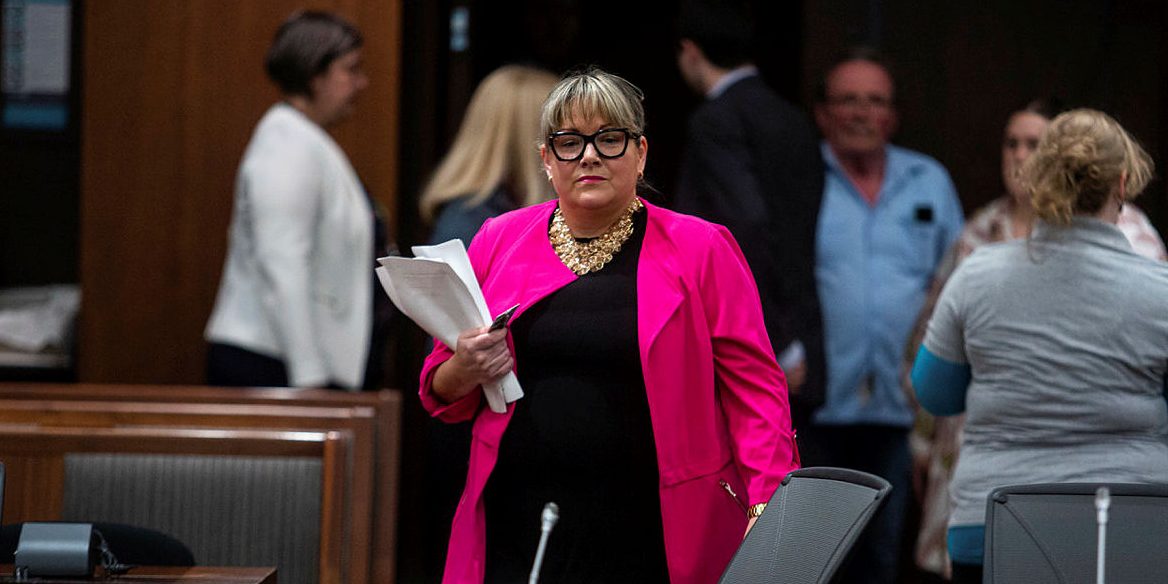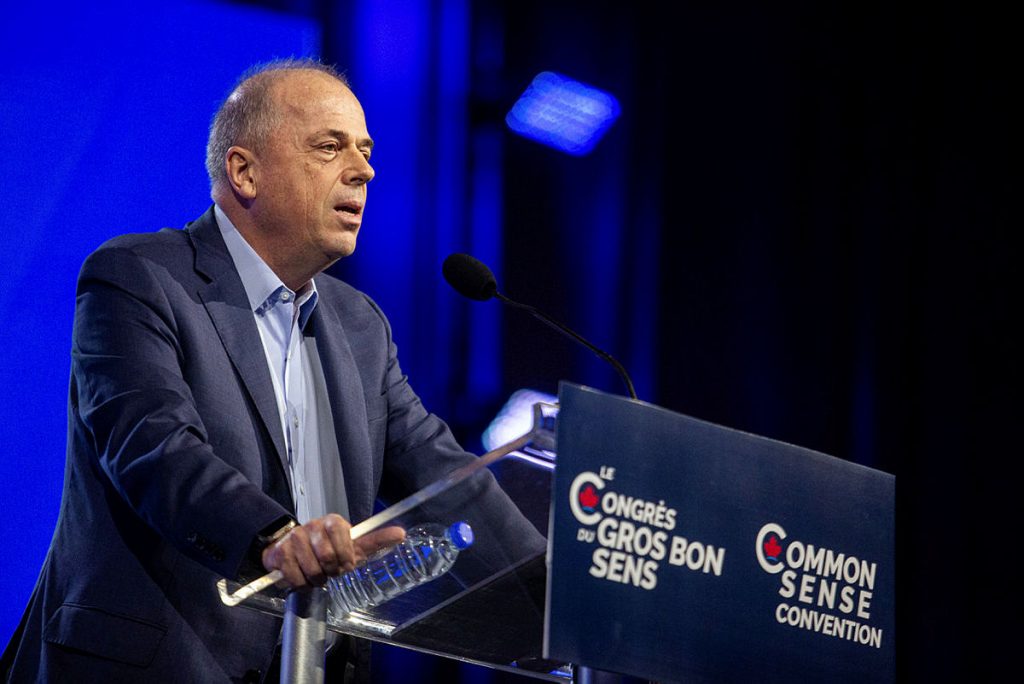Podcast interview not enough: campaign director Byrne should speak to national council about her future role with the party, say senior Conservatives

Conservative campaign director Jenni Byrne spoke about the party’s April election campaign loss and her future plans in a podcast interview last month, but has yet to brief the national council or the caucus about the same subject. Some senior party members say they would have preferred that she use internal forums before going public.
“The national council has not had real clarity on this,” one senior Conservative said in a not-for-attribution interview with The Hill Times. “All the clarity that the national council and other Conservatives are getting is from Jenni herself in her announcements through the podcast.”
The source said that since the April 28 contest, there have been three national council meetings—one in person and two virtual—but Byrne only attended the most recent one on Aug. 17. During the Zoom meeting, the 21-member national council, the party’s highest elected governing body, approved the delegate election rules for the Jan. 29-31 biennial policy convention in Calgary, Alta., where Pierre Poilievre (Battle River-Crowfoot, Alta.) will face a mandatory leadership review.
“She ran the campaign. She should have full accountability to all aspects of the party,” said a veteran Conservative. “That means to the Conservative Fund, the national council, the caucus, and, in a broader sense, to the membership at [the upcoming] convention. Look, the buck stops with her.”
Since Poilievre was elected the party’s leader in 2022, Byrne, his closest adviser and confidante, has regularly represented him at the national council. However, Byrne missed both the June 14 quarterly meeting held in person—which was the first meeting after the election— and the July 2 meeting on Zoom. The national councillors had expected a debrief from Byrne at the June 14 meeting about why the party lost the last election but did not get one.
In a text message to The Hill Times in June, Byrne said that she missed the quarterly meeting on June 14 because of a prior commitment.
“I had a previous commitment that I agreed to in January before the meeting was set,” wrote Byrne. “I’ll be at the next one.”
The incumbent Conservative party leader, according to the party constitution, is an automatic member of the national council, which includes representation from all regions of the country. The leader, however, rarely attends council meetings and usually a close aide will represent the them at those meetings.
Because of Byrne’s absence—where she would have represented Poilievre— from the two meetings, Robert Staley, chair of Conservative Fund Canada, represented the leader at both. Staley is also an ex-officio member of the national council.
Following the April 28 election, the Liberals won 43.7 per cent of the vote and carried 169 seats—three short of a majority—in the 343-member House of Commons. The Conservatives received 41.3 per cent of the vote and secured 144 seats. The Bloc Québécois—which runs candidates only in Quebec—and the New Democratic Party each garnered 6.3 per cent of the vote, with the Bloc winning 22 seats and NDP taking seven. The Greens earned 1.2 per cent of the vote, and managed to win just one seat.
In comparison, after the 2021 federal election—when the House had 338 seats—the Liberals won 160 seats, the Conservatives 119, the Bloc 32, the NDP 25, and the Greens two.
Byrne was not available for an interview for this article.
As the top adviser to Poilievre, Byrne came under fire from party insiders and grassroots party members after failing to deliver a victory for her party.
In a wide-ranging interview with the Beyond a Ballot podcast that was released on Aug. 8, Byrne announced she will not serve as her party’s campaign director in the next election. As for the Conservatives’ election strategy, she said the party has captured what she calls the “COVID voter,” a cohort of young, working-class Canadians who were impacted by the pandemic’s policies and its lingering impact on housing and affordability. This group is in contrast to people she describes as “comfortable boomers,” who live in mortgage-free homes and don’t have the same economic concerns.
During the podcast, Byrne recalled an event in Windsor, Ont. about a year-and-a-half ago when a father told her, “I got one fucking kid upstairs, I got one fucking kid in the basement … they want to move out … they both make six figures and can’t afford to get a place.”
This coalition of voters unable to afford their own home will be the party’s anchor moving forward, she said.
Byrne also defended the Conservatives’ decision not to pivot its messaging to focus on United States President Donald Trump’s trade war and threats of annexing Canada.
“I would point out we had a very good campaign message [on] affordability, cost of living, housing,” she said during the podcast, describing those as issues that “appealed very much to the new younger voter” who doesn’t “have the luxury” to base their vote on Trump’s antics.
“It’s not that they weren’t cognizant about what’s going on with Donald Trump, but it wasn’t affecting their lives,” she said, adding that Poilievre often spoke about Trump at campaign rallies, media availabilities, and in stump speeches, but didn’t focus his entire message around the trade war.
She said Liberals were trying to “bait” Tories into talking about Trump more often, but “from a practical point of view, I don’t know what we would have said every day.”
Carney, by contrast, “lied” about how he would deal with Trump, she said.
“He said, ‘you know, I’ve negotiated with Trump. I know how to deal with these businessmen,’ and he hasn’t been.”
Byrne said she never felt like her opinion was ignored or belittled because she’s a woman, and also denied being the sole single driving force behind the campaign.
“If they think that I was like a one-person machine who was making every decision, ran the campaign by myself, like I was some Rasputin or Svengali, then they don’t know how campaigns are run,” she said. “They don’t know Pierre, they don’t know [the] senior-level people that we had in the campaign.”
Byrne said she wouldn’t run the next federal Conservative campaign, saying she would spend more time working in her government and public relations firm, Jenni Byrne and Associates, based in Toronto. She quipped that she had a “shitty apartment” in Ottawa and had been commuting from Toronto during the campaign. Byrne also said she would stay on as an adviser to Poilievre.
“Frankly, I will be just as happy, and I will be just as valuable to the movement doing this,” she said.

Meanwhile, since the nomination process started during the last election cycle, the council has faced criticism for letting senior party officials run what some potential candidates and veteran party insiders told The Hill Times amounted to “the most centralized” nomination process in recent history.
On governance, the council has also been accused—by veteran Conservatives and grassroots party members—of being the “most obedient” to party officials in years.
Following the election loss, the council formed a seven-member ad hoc committee on nominations to recommend new rules for the next election cycle. The committe’s findings are scheduled to be presented at the quarterly meeting on Oct. 4. That meeting, which was originally set for September, was delayed for “logistical” reasons.
A senior Conservative familiar with internal nomination decisions told The Hill Times that promises of open, fair, and transparent contests are no longer practical in modern times, even though party leaders—both Conservative and Liberal—continue to make such pledges to the grassroots to keep them engaged. The source said that election readiness officials want candidates that are best positioned to win, and argued that new rules are needed.
“What’s called an open vote doesn’t lead to the best candidate anymore because when you have an open vote, what that means is the most organized and focused ethnic or cultural group who can show up with 1,000 members wins,” said the source, adding that these individuals typically have difficulty communicating in either of the two official languages and aren’t really engaged.
The source however conceded that senior party officials, on occasion, do play favourites and “outrightly rig” the rules to get the candidates they want.





 LICENSING
LICENSING PODCAST
PODCAST ALERTS
ALERTS













